Bwa Bwei (擲筊) Divination Blocks, Moon Boards, Moon Blocks, Poe or Bwei (筊, 筶, 盃 或者 杯)
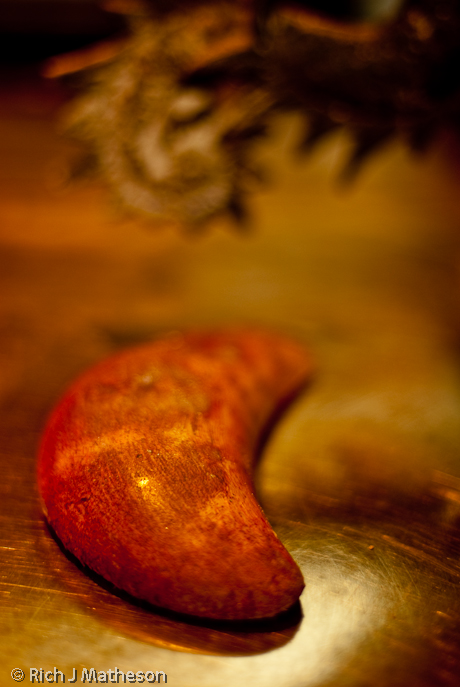 Getting married and want to know if you are marrying the right person? Looking for a high school friend you haven’t heard from for thirty years? Wondering where your wallet is? Should you sell your house?, and when? Health, wealth, career and love. These are all plausible questions for the gods. When facing a difficult decision many Taiwanese will turn to the gods for answers. One of the most common methods is to simply ask a god yourself through the mediation of “Bwei”(筊) those, often red, new moon shaped blocks always heard clacking onto the temple floors.
Getting married and want to know if you are marrying the right person? Looking for a high school friend you haven’t heard from for thirty years? Wondering where your wallet is? Should you sell your house?, and when? Health, wealth, career and love. These are all plausible questions for the gods. When facing a difficult decision many Taiwanese will turn to the gods for answers. One of the most common methods is to simply ask a god yourself through the mediation of “Bwei”(筊) those, often red, new moon shaped blocks always heard clacking onto the temple floors.
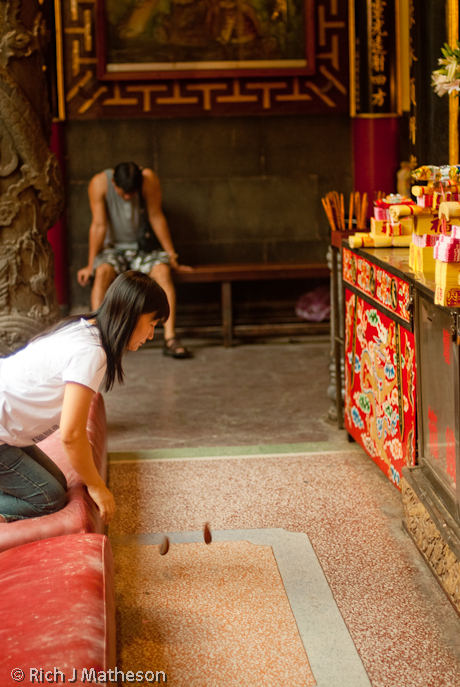
Here is a simple guide to using divination blocks, which of course varies slightly from temple to temple and region to region:
Sincerity. Be sincere in your belief and questions. If you really want to get an answer, you will. If you are insincere you are wasting your time as well as the god’s time.
Find a suitable temple. While the Jade Emperor is the most powerful god, He may not necessarily be the best for you. Find a temple that you feel comfortable with and have faith in.
Pose the question several days in advance. Preferably on a red piece of paper, write your question and all necessary details such as your name address, “ba tz”(八字) (date/time of birth) and any other information pertinent to the question and place it on the altar for the god to see. This will give the god time to check things out; going to the new house if you are considering moving, or checking out your future spouse if you are contemplating marriage.
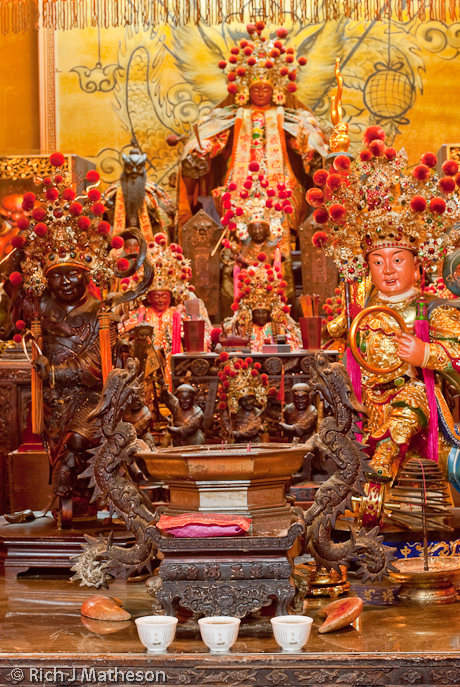
Burn incense.燒香 When you return to the temple after giving the god time to consider your question some incense should be put in the temple urns as offerings. A standard number would be six sticks. Three outside for The Jade Emperor and three inside for the temple gods. Squares of three (3, 6, 12, 24…) should be used. This offering demonstrates respect and reverence.
“Tieu Wen Chiam”(籤) Draw a Fortune Stick. Gathering the tops of all the fortune sticks in your hands give a quick lift, twist and drop motion, mix the sticks and choose a stick that stands out. This stick will hopefully contain the answers to your question. Any method of choosing a stick would suffice but it seems this is the method most often employed. Place the stick on the altar in front of the god.
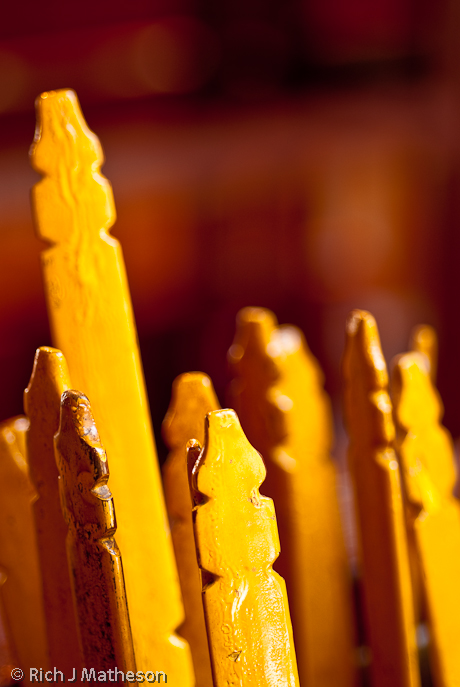
“Bwa bwei”(擲筊) Now you are ready to throw (bwa) the divining blocks (Bwei). Begin by bowing respectfully to the god, state your name and address down to the street name and number. Sometimes, especially with foreigners, a person is hard to find and brothers, parents and ancestors names are often required to find the identity of the questioner. The god will not give an answer unless absolutely sure of the identity of the questioner. Remind the god of your question and clasp the divining blocks in both hands and raise them to shoulder height in a praying position and toss them to the ground.
Read the bwei.
Both blocks up(3X) 笑筊:即正正(陰陰)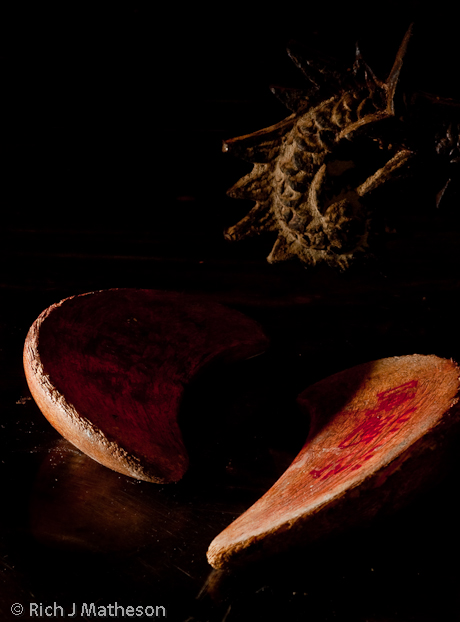 = You have asked an odd question. Doesn’t know how to answer. Change your question; and choose another stick or begin the whole procedure again after considering what you have asked incorrectly.
= You have asked an odd question. Doesn’t know how to answer. Change your question; and choose another stick or begin the whole procedure again after considering what you have asked incorrectly.
One up one down(3X) 聖筊:即一正一反(一陰一陽)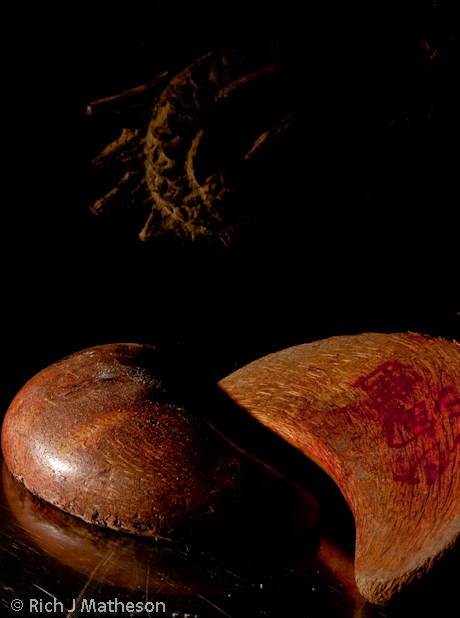 = Yes, you have the right stick.
= Yes, you have the right stick.
Both blocks down(3X) 陰 筊:即反反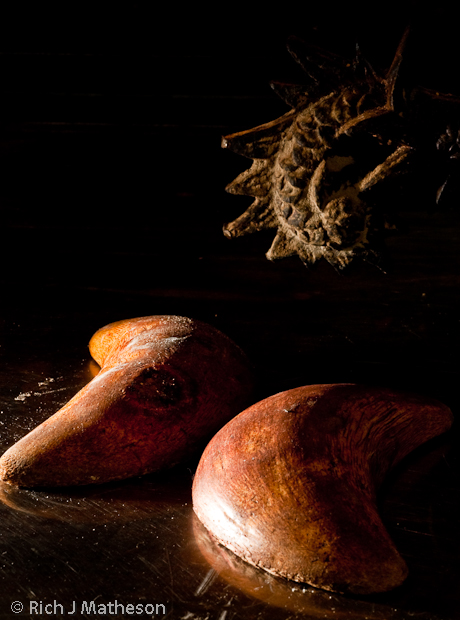 = No, choose another stick and repeat the procedure.
= No, choose another stick and repeat the procedure.
The blocks must land the same way three times consecutively to be valid and there is no limit to the amount of times you throw until you get an answer (three in a row). The god will guide you through the bwei until you get the correct stick. After every toss your gratitude should be expressed and your question should be reiterated.
Example: Toss. One up one down. “Thank you, I appreciate your guidance. With deep respect I ask again: are you sure this is the right stick to help me in my dilemma?” Toss. One up one down. “OK it seems I’m on the right track in finding my answer, I appreciate this very much. Are you 100% sure this is the right stick?” Toss again. One up one down. Sincerely, “Guan Di Yeh, thank you for your direction and help.
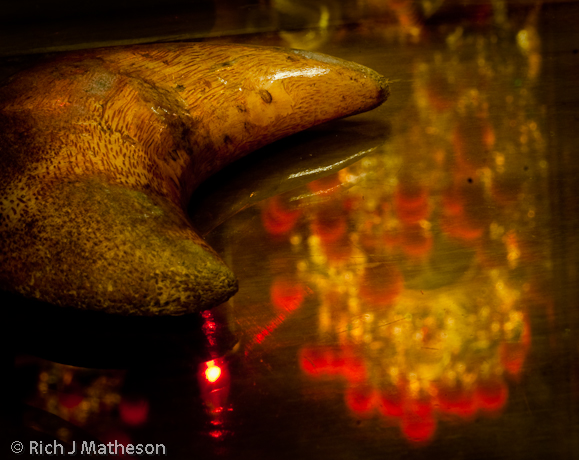
Your Answer. Now, assuming your question was asked clearly and sincerely, you should have your stick. Take the Bamboo fortune stick to the clerk and you will get your answer on a piece of paper that corresponds to the number on the stick.That’s it. The fortune papers have many answers in categories such as business, love, health, etc. and one will answer your question. Your answer may be very clear–don’t go to the hospital in November–, or a little vague–go north-west to find what you are looking for. There are nine different grades of fortunes using all the combination pairs of up(上上)-good, middle(中中)-neutral and down(下下)-bad. With up-up being the best fortune and down-down being the worst. If you asked how you would deal with the traffic in Taiwan and you got a down-down fortune you would likely be hit by a truck when you left the temple.
Some notes:
*For this service there is no fee but a small sum in the temple donation box is the usual way to show your gratitude for a useful answer.
*When asking questions of ancestors or others who are not gods, divining blocks may not be used, coins should be used in their stead. Heads=up.(although Jordan states divining blocks may be used with ancestors)
*If you are having trouble getting an answer you will need to rework your question as you go. The god is trying to guide you to the right question. It is up to you to find the right question. I was told you need to try to guess the gods thinking.
*”Bwa bwei” is one of those Taiwanese words that, when you ask a Taiwanese how to say in Mandarin Chinese you will probably stump about 80 percent, well here in the south anyway.
*An excellent article on Taiwanese divination blocks may be found here:Taiwanese Poe Divination: Statistical Awareness and Religious Belief where David K. Jordan goes into a fascinating dichotomy that is often present in Taiwanese religion.
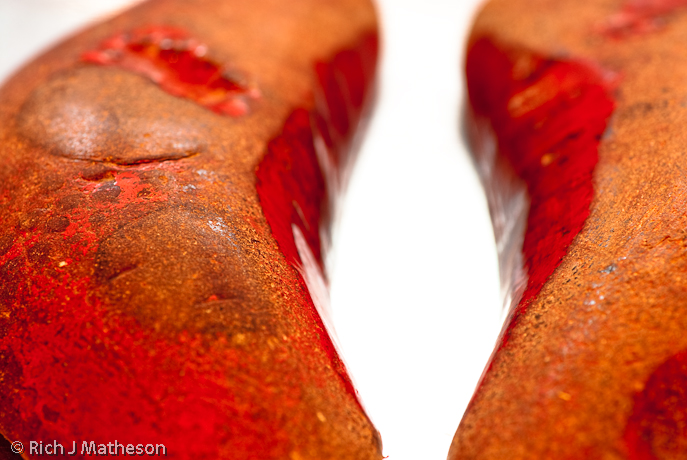
*Or for a much more scholarly and informative account of Poe, read The Poe in the divination chapter of David K Jordan’s excellent “Gods Ghosts and Ancestors” . Now online!!!
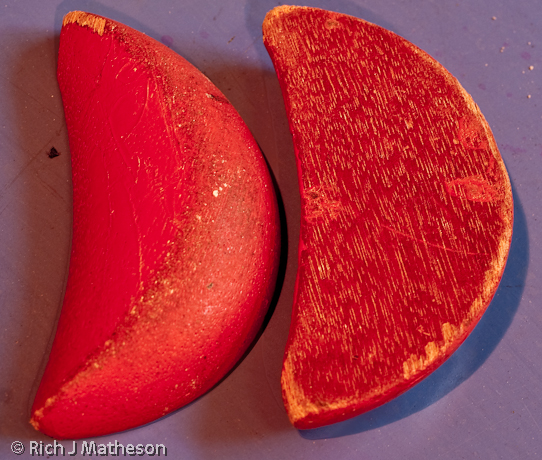


Pingback: Links 18 May 2009 - David on Formosa
Very nice photos on this blog. I like the colors and the mood.
Thumbs up!
September 11, 2009 at 4:41 pm
Thanks, love your photos and studio looks awesome. Pity you are in Taipei.
September 11, 2009 at 4:51 pm
Pingback: Sacrificial Pigs, God Pigs and Festivals 神豬 « Liefintaiwan’s Weblog
Pingback: The Seven Links Project: Seven Old Blog Posts Revisited « Liefintaiwan
Quick question.In the chien chest were all the fortune papers are located. Are the fortune papers the same for each number? For example if in the number 30 chest. are all the messages/papers the same there? or do they differ?
October 26, 2011 at 10:00 am
Grant, I’m pretty sure they are all different. I will ask next time I am in a temple.
October 27, 2011 at 12:10 am
Ohh.. ok.. so that means in the number 30 chest there are still different messages there?
October 27, 2011 at 1:35 am
Grant, That is my guess. I will ask.
October 27, 2011 at 11:50 am
Hi Rich can I have your email? I just have a lot of things to ask from you. If that’s ok with you hehe. Thanks
November 2, 2011 at 1:17 am
Sure Grant, My email is liefintaiwan@gmail.com
and sorry, I have been busy and forgot to ask about the slips.
November 2, 2011 at 1:11 pm
Thanks Rich. I already send something in your email. Thank you so much again.
November 3, 2011 at 10:43 am
Pingback: A Taiwanese Magic Eight Ball (Out of Context) | Wai-Taiwan?
Pingback: A Children’s Treasury of Easy Magic Projects « The Digital Ambler
Pingback: Taiwan Folk Religion | Ntuchamber
Pingback: Probability Is Logic: Philosophy of Probability & Statistics Video Series | William M. Briggs
Pingback: February 2015 – 洋洋如意 | Taiwanvore
Pingback: Taiwan Folk Religion | Taiwan Missions